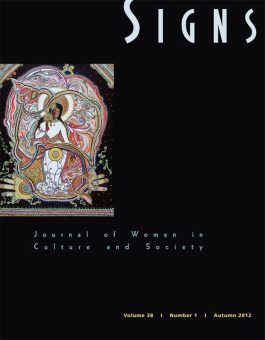Signs’s Autumn 2012 issue begins with a symposium on Romani Feminisms, edited by Ethel C. Brooks. Bringing together scholars and activists, the symposium examines the complex ways that Romani women and feminists are positioned in relation to states, communities, and nongovernmental organizations, as well as their multivalent responses to such positionings. In response to the “increasingly precarious situation for Roma worldwide,” Brooks writes in her introduction, the symposium is a “way of marking our existence as Romnia and feminists; it is a witness to our presence, proof of our existence, and a claiming of our always-precarious place in the world” (1).
Articles in the issue explore feminist field formations: from the erasure of class and surprising convergences in the theorization of sex work; to third-wave feminism’s reproduction of whiteness; to dissertations produced in women’s studies; to a comparison of feminist, race movement, and autonomous women-of-color publications; to an overview of indigenous and lesbian feminisms in Latin America. The final two articles deal with the institutionalization of children’s rights in Peru and the Crisis Pregnancy Center in the United States, thus providing vastly different takes on the institutional dynamics of activist movements.
To access the issue on JSTOR, click here.
The full table of contents is as follows:
Comparative Perspectives Symposium: Romani Feminisms
Edited by Ethel C. Brooks
The Possibilities of Romani Feminism
Ethel C. Brooks
Romani Feminism in Reactionary Times
Alexandra Oprea
Either Sing or Go Get the Beer: Contradictions of (Romani) Female Power in Central Europe
Petra Gelbart
Education, Agency, and Power among Macedonian Muslim Romani Women in New York City
Carol Silverman
Translating Intersectionality Theory into Practice: A Tale of Roma-Gadže Feminist Alliance
Debra Schultz
Personal Encounters and Parallel Paths toward Romani Feminism
Nicoleta Biţu and Enikő Vincze
Articles
Sex, Work, and the Feminist Erasure of Class
Brooke Meredith Beloso
Transmuting Grammars of Whiteness in Third-Wave Feminism: Interrogating Postrace Histories, Postmodern Abstraction, and the Proliferation of Difference in Third-Wave Texts
Rebecca L. Clark Mane
Analyzing Women’s Studies Dissertations: Methodologies, Epistemologies, and Field Formation
Sally L. Kitch and Mary Margaret Fonow
Writing the Way to Feminism
Erica E. Townsend-Bell
From the Margins of Latin American Feminism: Indigenous and Lesbian Feminisms
Ángela Ixkic Bastian Duarte
Ambivalence, Conflation, and Invisibility: A Feminist Analysis of State Enactment of Children’s Rights in Peru
Mikaela Luttrell-Rowland
In the Name of the Mother: Renegotiating Conservative Women’s Authority in the Crisis Pregnancy Center Movement
Kimberly Kelly
Book Reviews
| Stephanie Clare | When Did Indians Become Straight? Kinship, the History of Sexuality, and Native Sovereignty. By Mark Rifkin. Spaces between Us: Queer Settler Colonialism and Indigenous Colonization. By Scott Lauria Morgensen. Queer Indigenous Studies: Critical Interventions in Theory, Politics, and Literature. Edited by Qwo-Li Driskill, Chris Finley, Brian Joseph Gilley, and Scott Lauria Morgensen. |
| Margo Hobbes Thompson | Adrian Piper: Race, Gender, and Embodiment. By John Bowles. Enacting Others: Politics of Identity in Eleanor Antin, Nikki S. Lee, Adrian Piper, and Anna Deavere Smith. By Cherise Smith. |
| Julietta Hua | Spectacular Rhetorics: Human Rights Visions, Recognitions, Feminisms. By Wendy S. Hesford. Gender and Culture at the Limit of Rights. Edited by Dorothy L. Hodgson. |

